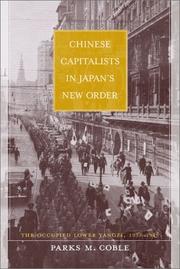| Listing 1 - 1 of 1 |
Sort by
|

ISBN: 0520232682 0520928296 128235664X 9786612356643 1597345334 9780520928299 0585465940 9780585465944 9780520232686 6612356642 9781597345330 9781282356641 Year: 2003 Publisher: Berkeley University of California Press
Abstract | Keywords | Export | Availability | Bookmark
 Loading...
Loading...Choose an application
- Reference Manager
- EndNote
- RefWorks (Direct export to RefWorks)
In this probing and original study, Parks M. Coble examines the devastating impact of Japan's invasion and occupation of the lower Yangzi on China's emerging modern business community. Arguing that the war gravely weakened Chinese capitalists, Coble demonstrates that in occupied areas the activities of businessmen were closer to collaboration than to heroic resistance. He shows how the war left an important imprint on the structure and culture of Chinese business enterprise by encouraging those traits that had allowed it to survive in uncertain and dangerous times.Although historical memory emphasizes the entrepreneurs who followed the Nationalists armies to the interior, most Chinese businessmen remained in the lower Yangzi area. If they wished to retain any ownership of their enterprises, they were forced to collaborate with the Japanese and the Wang Jingwei regime in Nanjing. Characteristics of business in the decades prior to the war, including a preference for family firms and reluctance to become public corporations, distrust of government, opaqueness of business practices, and reliance of personal connections (guanxi) were critical to the survival of enterprises during the war and were reinforced by the war experience. Through consideration of the broader implications of the many responses to this complex era, Chinese Capitalists in Japan's New Order makes a substantial contribution to larger discussions of the dynamics of World War II and of Chinese business culture.
China - Foreign relations - Japan. --- Shanghai (China)-- Economic conditions. --- Sino-Japanese Conflict, 1937-1945. --- Sino-Japanese War, 1937-1945. --- Sino-Japanese War, 1937-1945 --- Business & Economics --- Economic History --- Economic aspects --- Shanghai (China) --- China --- Japan --- Economic conditions. --- Politics and government. --- Foreign relations --- Chinese-Japanese War, 1937-1945 --- Japan-China War, 1937-1945 --- Japanese-Chinese War, 1937-1945 --- Second Sino-Japanese War, 1937-1945 --- Sino-Japanese Conflict, 1937-1945 --- Shanghai --- Changhaï (China) --- Shang-hai (China) --- Shang hai shi (China) --- Shanghai Shi (China) --- Shanghai Municipality (China) --- Shanghai Shi ren min zheng fu (China) --- Shankhaĭ (China) --- Xangai (China) --- 上海 (China) --- Ṣămhayi (China) --- Chang-hai (China) --- Schanghai (China) --- 上海市(China) --- 上海市人民政府 (China) --- Шанхай (China) --- Śangqai (China) --- battle of shanghai. --- beijing. --- business culture. --- business. --- capitalism. --- central china. --- changzhou. --- china. --- chinese businessmen. --- chinese corporations. --- chinese history. --- collaboration. --- colonialism. --- confucian capitalism. --- corporate culture. --- corporation. --- empire. --- entrepreneur. --- family business. --- government regulation. --- guanxi. --- historical memory. --- invasion. --- japan. --- japanese imperialism. --- military. --- nanjing. --- nationalist army. --- nonfiction. --- occupation. --- rebellion. --- regime. --- resistance. --- wang jingwei. --- war. --- world war two. --- ww2. --- yangzi.
| Listing 1 - 1 of 1 |
Sort by
|

 Search
Search Feedback
Feedback About UniCat
About UniCat  Help
Help News
News